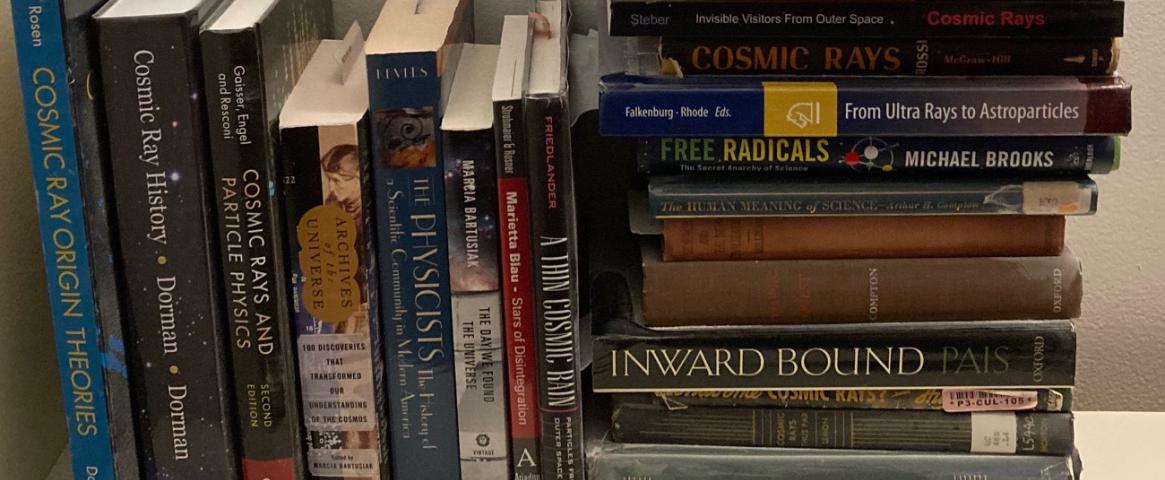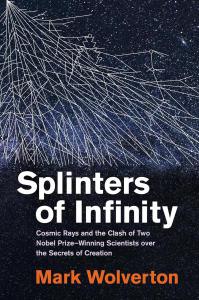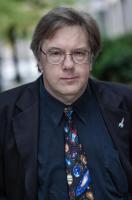
Mark Wolverton—Splinters of Infinity: Cosmic Rays and the Clash of Two Nobel Prize-Winning Scientists over the Secrets of Creation
COSMIC RAYS AND THE CLASH OF
TWO NOBEL PRIZE-WINNING SCIENTISTS
OVER THE SECRETS OF CREATION
Mark Wolverton
MIT Press, March 12, 2024, $29.95
ISBN 13: 9780262048828
Wolverton reports:
After publishing two books in a row on nuclear weapons, I decided I needed a change of pace for the next book, something more benign. I settled on two of my favorite areas, astronomy and history, and became fascinated with the topic of cosmic rays, still something of a mystery over a century after their discovery.
I recalled a historical episode I'd discovered during research for another project about two of America's most eminent scientists, Robert A. Millikan and Arthur H. Compton. In the early 1930s, these Nobel Prize winners became embroiled in a bitter feud over one of the biggest scientific questions of the time: the true nature of cosmic rays. It started as just a professional difference of opinion but soon exploded into a controversy that became a press and public cause célèbre, fueled by the fact that the topic held great scientific, philosophical, and even religious implications about the nature and fate of the universe.Here was my subject. Not only did it provide a chance to write about astronomy combined with science and cultural history, but I felt that the whole idea of cosmic rays had a poetry, a lyricism, a beauty to it that the gloom and doom of nuclear annihilation decidedly lacks.
After I put together a proposal partly based on a previous magazine article I'd published on the story, my marvelous agent Michelle Tessler sold the book to Jermey Matthews at MIT Press. Unfortunately, that happened just as the COVID-19 pandemic was taking hold and closing down all the libraries and archives I'd counted on visiting for archival research.
As restrictions began to ease somewhat, however, those resources opened up for remote access. A wonderful group of librarians and archivists at Washington University, Caltech, the American Philosophical Society, and MIT Libraries provided me with vast amounts of material electronically. Aside from my book advance, the research and writing of the book were supported by a grant from the Alfred P. Sloan Foundation.
Contact info:
- Mark Wolverton: mark@markwolverton.com, http://www.markwolverton.com/
- Book: Splinters of Infinity: Cosmic Rays and the Clash of Two Nobel Prize-Winning Scientists over the Secrets of Creation
- Publicist: Katie Lewis, 1077221 (England), lewisk@mit.edu
- Agent: Michelle Tessler, 212-242-0466, michelle@tessleragency.com
NASW members: will your book be published soon? Promote it by submitting your report for Advance Copy.
Tell your fellow NASW members how you came up with the idea for your book, developed a proposal, found an agent and publisher, funded and conducted research, and put the book together. Include what you wish you had known before you began working on your book, or had done differently.
See https://www.nasw.org/advance-copy-submission-guidelines.
View Advance Copy archives at https://www.nasw.org/member-article/advance-copy.
Thinking of writing a book? If you are a NASW member, you may access a list of more than 200 books and online resources to help you craft your book proposal, find an agent and funding sources, negotiate your contract, learn about self-publishing, publicize and market your book, and more at https://www.nasw.org/article/write-book.
View the recording of a recent Advance Copy Virtual Business Chat, A Primer for Authors on Book Publicity. NASW member login required.
View the recording of a recent Virtual Business Chat presented by NASW’s Freelance Committee and Advance Copy column Writing Wikipedia Profiles. NASW member login required.
Send book info and questions about book publishing to Lynne Lamberg, NASW book editor, llamberg@nasw.org.
Follow @LynneLamberg and @lynnelamberg.bsky.social for news about NASW authors, science/medical books, and writing.
Banner image adapted from original photo by Mark Wolverton.
Advance Copy
The path from idea to book may take myriad routes. The Advance Copy column, started in 2000 by NASW volunteer book editor Lynne Lamberg, features NASW authors telling the stories behind their books. Authors are asked to report how they got their idea, honed it into a proposal, found an agent and a publisher, funded and conducted their research, and organized their writing process. They also are asked to share what they wish they’d known when they started or would do differently next time, and what advice they can offer aspiring authors. Lamberg edits the authors’ answers to produce the Advance Copy reports.
NASW members: Will your book be published soon? Visit www.nasw.org/advance-copy-submission-guidelines for information on submitting your report.
Publication of NASW author reports in Advance Copy does not constitute NASW's endorsement of any publication or the ideas, values, or material contained within or espoused by authors or their books. We hope this column stimulates productive discussions on important topics now and in the future as both science and societies progress. We welcome your discussion in the comments section below.


